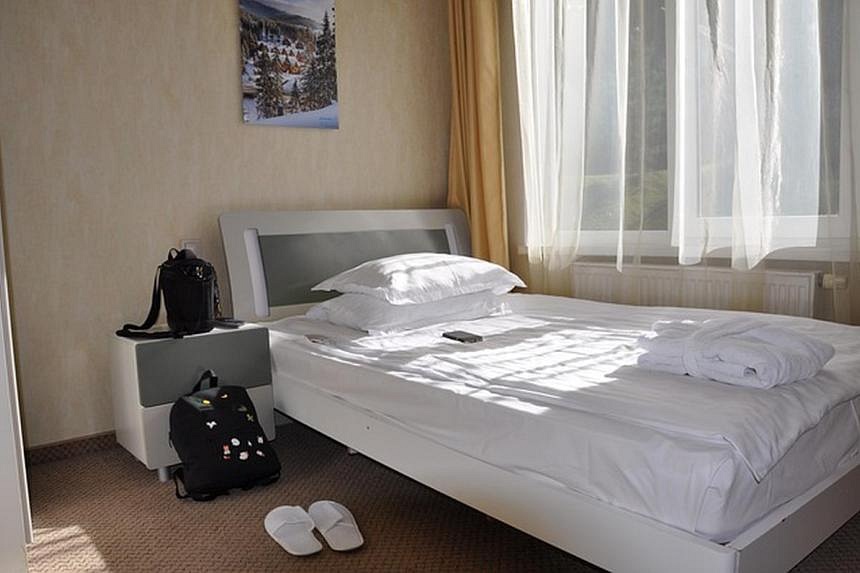Are disposable hotel slippers the next plastic straws?

COSTA RICA – In November 2023, managers at the Arenas del Mar resort near Manuel Antonio National Park in Costa Rica challenged employees to come up with ways to operate more sustainably.
The maintenance crew suggested electric locks on guest room doors. The food and beverage department proposed making jams from fruit peels. The housekeepers advised: Ditch the slippers.
“It didn’t make sense because you use them once and throw them out,” said president and co-founder Hans Pfister of Cayuga Collection, the hotel group that manages the resort, which took housekeeping’s advice. “It’s very wasteful.”
Like plastic straws and mini bottles of shampoo, disposable slippers – flimsy models usually made of plastic and fabric, and often found bedside at turndown or bagged in hotel closets – are the next single-use item in the crosshairs of sustainability activists.
“Anything single-use is problematic,” wrote Professor Willy Legrand, a sustainable hospitality expert and a professor at the IU International University of Applied Sciences in Bad Honnef, Germany, in an e-mail.
He cited the large footprint of a small slipper once you factor in production, shipping and waste. Single-use slippers, he said, “feel out of place and out of touch”.
Ms Nina Boys, vice-president of sustainability for Beyond Green, a group of hotels vetted for their sustainability practices, called slippers “low-hanging fruit” in the fight against plastic.
While plastic straws can be easily replaced with paper versions and small shampoo bottles by larger dispensers, subbing for slippers is more complicated based not just on materials, but cultural expectations and perceptions of luxury.
Providing slippers in hotels is rooted in the Asian tradition of removing your shoes indoors, said Ms Diana Verde Nieto, a sustainability expert and author of Reimagining Luxury.
“As hotels started to cater to international guests, particularly those from Asia, the provision of slippers became a way to accommodate and respect these cultural norms,” Ms Verde Nieto wrote in an e-mail. She added that the comfort and hygiene associated with slippers have become a universal luxury standard today.
Offering slippers also helps hotels earn status ratings from travel organisations like AAA or the European Union’s Hotelstars.
Some resorts have found it easier to address sustainability through food waste and community engagement than footwear.
Winvian, the boutique resort with 18 cottages and one suite on 45ha in Connecticut’s Litchfield Hills, grows about 70 per cent of its produce on the property and built a cottage from the wood cleared at the site.
Guests receive reusable sandals in the spa, but in the rooms, visitors will find plusher designs that they are encouraged to take home and reuse. About half do and the rest are discarded.
“The problem is, it’s one of those things that people have come to expect,” said Ms Heather Smith Winkelmann, the resort’s managing director.
Mr Ivan Bauza, director of sales and marketing at the Setai, a luxury hotel in Miami Beach, Florida, said amenities such as full-size bottles of shampoo and slippers that are intended for guests to take home – occasionally including trendy models from the boutique brand Brunch – “shows the luxury aspect” of hospitality.
The waste associated with disposable slippers is sizeable, said Prof Legrand, who calculated that high-end hotels in the United States with an average occupancy of 63 per cent might discard more than 10 million pairs of slippers a month.
Hotel cleaning standards often dictate discarding slippers that have been removed from their packaging, according to members of Unite Here, the union that represents hotel housekeepers.
“Waste from hotel slippers may seem minor when compared to larger issues like energy consumption, food waste or water usage,” Prof Legrand wrote. “However, at the end of the day, every bit of waste adds up and increasing attention is being paid to these aspects as part of a broader sustainable industry approach.”
Hotel companies that have made commitments to banning single-use plastics have blazed a trail to more eco-friendly slippers.
Six Senses, a collection of 23 high-end resorts, offers slippers made from natural materials such as jute or bamboo, or from recycled plastic.
Six Senses Crans-Montana in Switzerland stocks Kaaita felt slippers made from recycled plastic bottles that can be washed and reused or recycled at the end of their life span.
Mandarin Oriental Hotel Group phased out single-use slippers in 2022 and replaced them with models made of cardboard, cork and cotton that are cleaned and restocked in the rooms.
The Dorian, Autograph Collection hotel in Calgary, Canada, stopped supplying disposable slippers in the hotel’s suites in favour of upgraded ones that are thicker and more durable. They are available on demand to guests in other rooms.
Patrons are encouraged to take them home for “multiple uses rather than single use”, wrote general manager Ian Jones in an e-mail.
Green Key, which vets hotels for sustainability practices, suggests hotels make slippers and other single-use amenities available on request, rather than mandating elimination.
In keeping with its commitment to eliminate single-use plastics, the Sheraton San Diego Hotel & Marina supplies slippers only to guests who ask for them. NYTIMES


No comments
Share your thoughts! Tell us your name and class for a gift (: